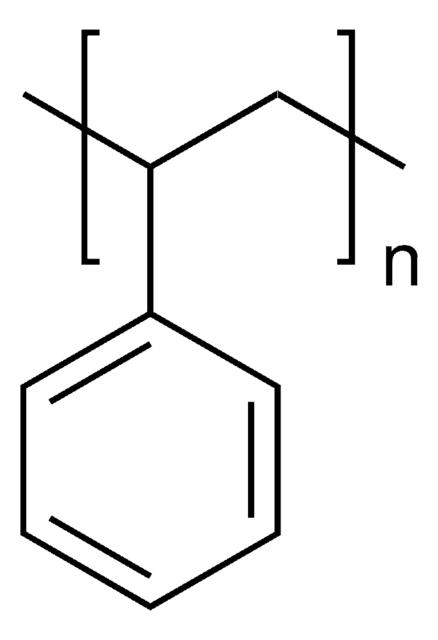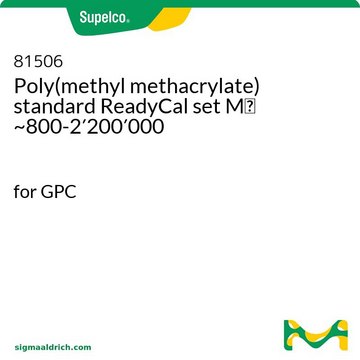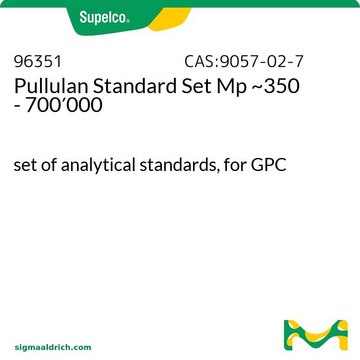76552
Polystyrene (low molecular) Standard ReadyCal Set M(p) ~250-65000
for GPC
Autenticatiper visualizzare i prezzi riservati alla tua organizzazione & contrattuali
About This Item
Codice UNSPSC:
41116107
NACRES:
NA.24
Prodotti consigliati
Grado
for GPC
Livello qualitativo
Durata
limited shelf life, expiry date on the label
tecniche
gel permeation chromatography (GPC): suitable
Formato
neat
Temperatura di conservazione
2-8°C
Componenti
ReadyCal Standards are polymer cocktails pre-weighed into autosampler vials for the convenient calibration of GPC/SEC/GFC systems.
This kit contains 10 sets of 3 color-coded vials, each containing four polystyrenes of different molar masses. Molar masses range from ~266 to ~66,000 Da and are carefully selected so that polymer traces are baseline separated.
Sufficient material provided for at least 10 calibrations.
Suitable for calibrations in THF, toluene, DMF, DMAc, chloroform, TCB, DCB and NMP.
This kit contains 10 sets of 3 color-coded vials, each containing four polystyrenes of different molar masses. Molar masses range from ~266 to ~66,000 Da and are carefully selected so that polymer traces are baseline separated.
Sufficient material provided for at least 10 calibrations.
Suitable for calibrations in THF, toluene, DMF, DMAc, chloroform, TCB, DCB and NMP.
Codice della classe di stoccaggio
11 - Combustible Solids
Punto d’infiammabilità (°F)
No data available
Punto d’infiammabilità (°C)
No data available
Scegli una delle versioni più recenti:
Possiedi già questo prodotto?
I documenti relativi ai prodotti acquistati recentemente sono disponibili nell’Archivio dei documenti.
I clienti hanno visto anche
Barbara De Meester et al.
Nature communications, 11(1), 5020-5020 (2020-10-08)
Lignin causes lignocellulosic biomass recalcitrance to enzymatic hydrolysis. Engineered low-lignin plants have reduced recalcitrance but often exhibit yield penalties, offsetting their gains in fermentable sugar yield. Here, CRISPR/Cas9-generated CCR2(-/*) line 12 poplars have one knockout CCR2 allele while the other
Il team dei nostri ricercatori vanta grande esperienza in tutte le aree della ricerca quali Life Science, scienza dei materiali, sintesi chimica, cromatografia, discipline analitiche, ecc..
Contatta l'Assistenza Tecnica.





